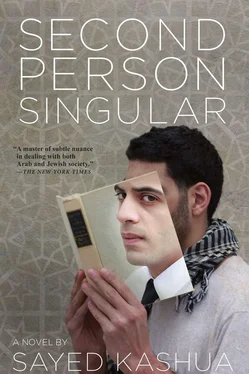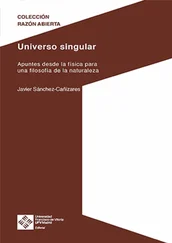“No, I was fine.”
“By the way, the guy I just spoke to is the landlord. Have you met him?”
“No.”
“The asshole lives on the top floor. He owns a few apartments in the building. He tried to tell me he didn’t know it hadn’t been fixed and that first thing tomorrow he was going to have a talk with his handyman. In the meantime, do you still have your hundred dollars for the rent?”
“Yeah, of course,” I said, reaching for my wallet.
“Good. Keep it. Don’t give him a cent. I told him that if tomorrow morning the boiler isn’t working, we’re going out to buy a new one with the next month’s rent. If he asks you for it, don’t pay him, okay?”
“Okay, sure.”
Majdi put out the cigarette and went into the kitchen. I heard the refrigerator door open. “Don’t tell me you didn’t eat anything either,” he yelled from the kitchen.
“No, I wasn’t hungry.”
“What, are you crazy? It’s after nine at night. You were just being polite. Ayouni, ” he said. “Make yourself at home, what kind of place do you think this is? I’m making dinner right now. Wassim will be back any minute, and then we’re sitting down to eat.”
THE COMMUTE
We used to leave the house together at seven fifteen. Those early-morning hours were pretty much the only times I saw my roommates. Majdi interned at the law office until the afternoon and from there he went to the Sheraton, where he worked as a cashier until nine or ten in the evening. Wassim taught in the morning, came home, and then headed out again at four thirty for his other job, as director of a hostel for the mentally ill in Shuafat. Sometimes I got home from the clinic in time to see him, but usually he had left the apartment before I got back.
I was the first one up in the morning, but Wassim was first to get out of bed. He’d boil water for coffee before even going to the bathroom. Then I’d get up and use the bathroom. Only when the coffee was ready did Wassim go back and wake Majdi. They were the same age but it seemed that Wassim was the responsible adult, a kind of older brother to his cousin Majdi, who, unlike him, had managed to get into law school.
Majdi was the last one into the bathroom and the last one dressed, but he was never late. Probably thanks to Wassim’s badgering. “Come on, are you up?” he’d say. “Let’s go, the coffee’s getting cold.” Or, “Come on, no time for a whole cigarette, we’re late, smoke on the way to the bus, yallah, let’s go.”
I liked those guys better than my old dorm roommates, and was glad to be rooming with them. Each morning we’d walk up the path through the projects and out onto the main road that linked Jerusalem and Ramallah, looking for a ride heading south. Our apartment was on the right side of the checkpoint that was within municipal Jerusalem.
Wassím and I liked the Ford Transit share-taxis. They were faster than the buses. But if they pulled over and only had a spot or two then we waited for whatever came next, van or bus. Majdi preferred the buses, liked their color and their ambience. They were old clunkers that the Israeli bus company had retired. The Palestinians bought them, painted a coat of blue over the red, and turned them into the main source of public transportation in the eastern part of the city. I thought they were awful. Loud and slow, unheated in winter and uncooled in summer. There were hardly any seats that weren’t broken, wobbly, or with springs jutting out. But Majdi loved them. As soon as he got on and paid the driver, he lit a cigarette. “It’s an experience,” he’d say. “Not only can you smoke, but the driver’s usually too busy lighting up his own cigarette to take your fare.”
Nearly all the men smoked on the bus. It was a sort of ceremony. The windows were always open, winter and summer, and hands would dangle out, cigarettes clasped between their fingers. “Palestinians,” Majdi used to say, “smoke more than any other people in the world.”
It’s not far from Beit Hanina to downtown east Jerusalem but the traffic in the morning was some of the most brutal in the country. The cars inched forward. A five-minute drive took half an hour, and that was on regular days, when there were no surprise checkpoints.
Majdi used to say that the green signal at the traffic light for the Arab cars from Beit Hanina and Shuafat was the shortest in the city. The settlers’ cars got five minutes of green for every half minute they gave us. One hundred thousand people waiting in line for a few settlers from Ma’ale Adumim, Neve Yaakov, and Pisgat Ze’ev. Each morning Majdi used to swear that the first thing he was going to do when he passed the bar was file an appeal against that fucking traffic light in the High Court of Justice. “It’s a sure win,” he’d say. “They’ll cover it everywhere in the Arab press. All I need is a good suit for the cameras and I’ll be the number-one lawyer in east Jerusalem. You’ll see. If you will it, it is no dream. ”
Majdi was first off the bus, at the Sheikh Jarrah stop. From there he took an Israeli bus to the center of town. I got off right after him, at the district court on Salah al-Din Street, and walked from there to the welfare office in Wadi Joz. Wassim took the bus all the way to the last stop, Damascus Gate, and from there he took a share-taxi to the school in Jabel Mukaber.
METHADONE
I was conscientious about getting to work on time. I always punched in before eight, even though the only other person in the office at that hour was the janitor. In general, there was not much to do at the office. I’d been far busier and far more stimulated as an intern. There were hundreds of addicts who had opened files in our office but only a handful of them were “active” cases, users who actually wanted to kick their habits. The rest just showed up to collect their income support, which they were eligible for only if they could prove that they were in treatment. And we did not make it difficult for them. We filed our reports to the Ministry of Social Affairs, renewing the welfare payments and the income support even if they didn’t come to a single meeting. It was the path of least resistance.
One year earlier, as a student intern, I’d come to the office twice a week. In order to get my BSW from Hebrew University I’d had to handle a minimum of four cases a year and the office manager, who was my supervisor, made sure that I met the requirement. Now I was a full-time employee, and four cases a year was too much to hope for. Full days passed with nothing to do. I had one active case, a forty-year-old addict who had seemed to want treatment but even he was starting to show the usual signs. It turned out that he was only going through the motions because his parole officer had insisted on seeing results.
The addicts mostly followed the same route: they came in, filled out a few questionnaires, talked to a social worker, took a urine test, and opened a file. They’d come back once a week and the few who actually seemed interested in rehab would be invited to a special advisory meeting attended by a social worker from the office, a municipal psychologist, and a district supervisor.
The addict would be sent to a methadone clinic and told to wait for an opening at the rehab center in Lifta, where there was only one bed allocated for the Arab residents of the city. When it became available, he’d be sent there for a two-month stay, with the main objectives being detox and the twelve-step program. They always came out of there happy and drug-free, swearing that they were new men, kissing the social workers and treating them like the parents they never had. Over the following weeks they would continue to come to the NA meetings, which were held downtown, and then, within a few months, they’d be using again. The sole success story, one that had achieved mythic status, was of a father of five, a fifty-year-old man who managed to stay clean for nearly a year. Aside from him, the east Jerusalem office had not managed to keep a single addict clean for any significant period of time in its fifteen-year history.
Читать дальше












